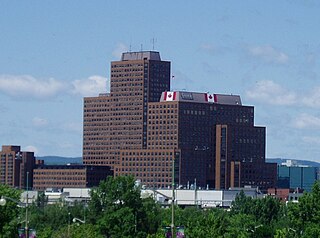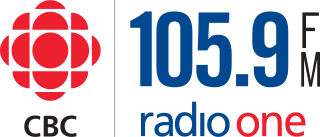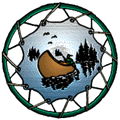
The Canadian Radio-television and Telecommunications Commission is a public organization in Canada with mandate as a regulatory agency for broadcasting and telecommunications. It was created in 1976 when it took over responsibility for regulating telecommunication carriers. Prior to 1976, it was known as the Canadian Radio and Television Commission, which was established in 1968 by the Parliament of Canada to replace the Board of Broadcast Governors. Its headquarters is located in the Central Building of Les Terrasses de la Chaudière in Gatineau, Quebec.

CBC Radio is the English-language radio operations of the Canadian Broadcasting Corporation. The CBC operates a number of radio networks serving different audiences and programming niches, all of which are outlined below.
Aboriginal Voices Radio Network was a Canadian radio network, which primarily broadcast music programming and other content of interest to aboriginal people. As of June 2015, the network operated stations in Toronto, Ontario, Calgary and Edmonton in Alberta, and Vancouver, British Columbia. All of its stations were licensed as rebroadcasters of its flagship station, CKAV-FM in Toronto. The network's administrative office was located in Ohsweken, Ontario, on the Six Nations Indian reserve near Brantford. The stations' music programming consisted mainly of adult contemporary music, along with specialty programs focusing on aboriginal-oriented content.
The Aboriginal Multi-Media Society (AMMSA) is an Aboriginal publisher in Canada. AMMSA was established in 1983 under the Alberta Societies Act and launched its first publication in March 1983 – simply titled AMMSA. The name of this publication was later changed to Windspeaker in March 1986.

CBC North is the Canadian Broadcasting Corporation's radio and television service for the Northwest Territories, Nunavut, and Yukon of Northern Canada as well as Eeyou Istchee and Nunavik in the Nord-du-Québec region of Quebec.

CBKA-FM is a Canadian radio station, broadcasting the CBC Radio One network at 105.9 FM in La Ronge, Saskatchewan.

CFYK-FM is a Canadian radio station broadcasting at 98.9 MHz (FM) in Yellowknife, Northwest Territories. The station is owned by the Canadian Broadcasting Corporation and broadcasts national programming of the CBC Radio One network along with regional programs as part of CBC North.
The history of FM broadcasting started just after World War II ended, but the experimental FM network did not begin until the 1960s.
CIAM-FM is a community Christian radio station broadcasting at 92.7 MHz on the FM dial in Fort Vermilion, Alberta, Canada. CIAM-FM is a listener supported community broadcast. CIAM Media & Radio Broadcasting Association is the registered charity that holds the broadcast license.

The Aboriginal Peoples Television Network is a Canadian specialty channel. Established in 1992 and maintained by governmental funding to broadcast in Canada's northern territories, APTN acquired a national broadcast licence in 1999. It airs and produces programs made by, for and about Indigenous peoples in Canada and the United States. Based in Winnipeg, Manitoba, it is the first network by and for North American indigenous peoples.
CHBD-FM is a radio station in Regina, Saskatchewan. Owned by Bell Media, it broadcasts a country format branded as Pure Country 92.7. Its studios are located at 4303 Albert Street in south Regina.

CFWE is a radio network based in Edmonton, Alberta. Owned by the Aboriginal Multi-Media Society, it broadcasts programming targeting northern Alberta's First Nations communities, including mainstream country music, and specialty shows featuring Indigenous music or presented in native languages such as Cree and Dene.
CBFG-FM is a mainly-French-language Canadian radio station located in Chisasibi, Quebec.
CIBC-FM is a low-power Type B Native radio station which provides First Nations community radio programming on the frequency of 98.1 MHz/FM in Cowessess, Saskatchewan, Canada. The station is owned by Cowessess Community Projects Inc., which received approval from the CRTC on May 9, 2012. In the application, the station said that it would broadcast at least ten hours a week in Cree, with the remainder of its programming in English.
CICN-FM was a radio station broadcasting First Nations community radio programming on the frequency 104.3 MHz (FM) on the Muskeg Lake Cree Nation at Marcelin, Saskatchewan, Canada.

Community radio in Canada is a legally defined broadcasting category governed by the Canadian Radio-television and Telecommunications Commission (CRTC). It is distinct from the other two categories, commercial broadcasting, and public broadcasting. Community radio can be considered a subcategory of alternative media. Community radio exists worldwide and is often broadly similar around the world, however, it can have variations in the government regulations that they are required to follow, the national or regional contexts in which its developed and the specific culture, goals or methods they adhere to.
Northern Native Broadcasting is a non-profit Indigenous communications company in British Columbia which owns and operates radio stations whose music and primary content is intended to be of interest to Indigenous peoples in Canada.
CFPO-FM is an indigenous peoples' radio station in Ottawa. Owned by First Peoples Radio, a subsidiary of Dadan Sivunivut, it broadcasts music and talk programming targeting the First Nations community. Music is both from mainstream and indigenous artists.

CJWE-FM is a radio station in Calgary, Alberta. Owned by the Aboriginal Multi-Media Society, it broadcasts programming targeting southern Alberta's First Nations communities, including mainstream country music, and specialty shows featuring indigenous music or presented in native languages such as Stoney. It is similar in format to its sister radio network CFWE, which focuses primarily on northern Alberta's First Nations communities.









